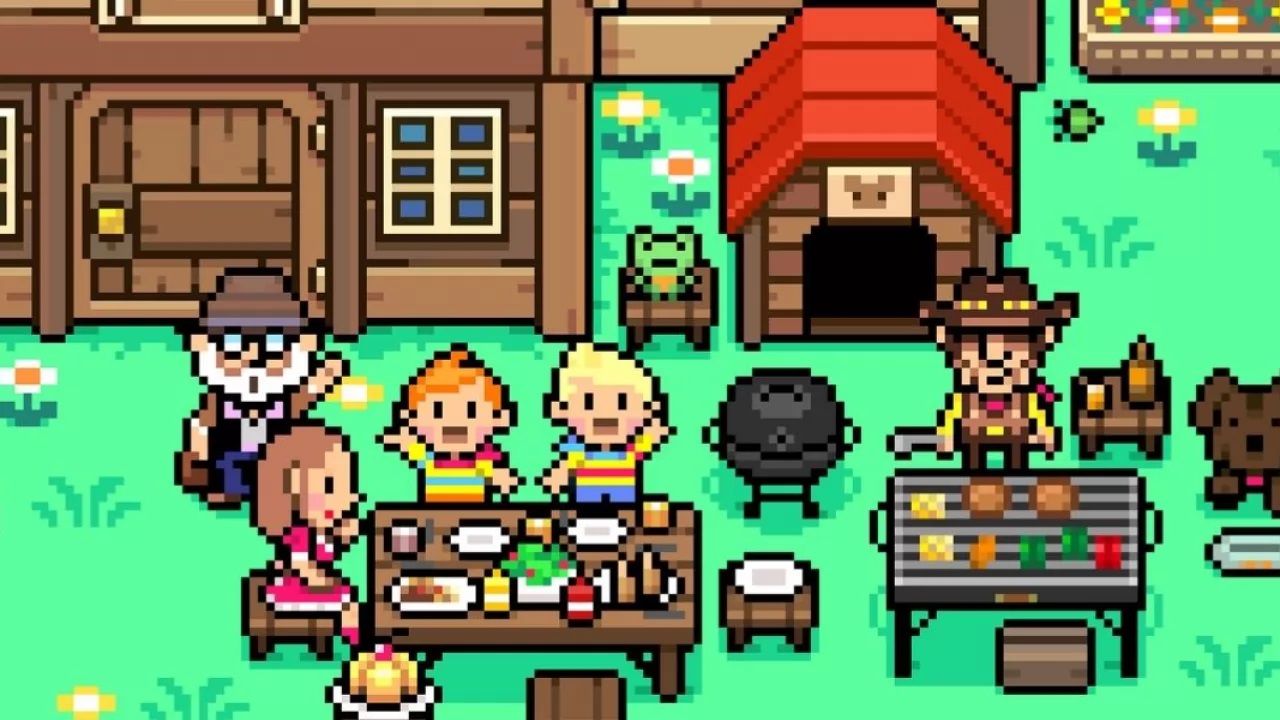
After a very frustrating interaction with the woman at the post office, I finally received my copy of Mother 3 for the GBA on October 2, 2024. It has been my goal to play this game in Japanese for two years. I am now at an ~N4 level of vocab and ~N3 level of grammar, so I think I'm ready to take the plunge!
I started up the game and was happy to see that the start screen is... entirely in English! I'm pretty sure NEW GAME is Japanese for "new game"... The opening music is spooky dings.
Introduction
Words and grammar from this section
赤ん坊 (akanbou) = baby
寝癖 (neguse) = bed hair
薪ストーブ (makisutoubu) = wood stove, 薪 alone is firewood
本格的 (honkakuteki) = authentic
ふかふか = soft and fluffy as a bed or bread
暖炉 (danro) = hearth, fireplace
寝坊 (nebou) = oversleeping, sleepyhead, ねぼすけ is also sleepyhead or oversleeper
とっくに = A while ago
ちゃんと = readily, sufficiently, diligently, perfectly, quickly (apparently it means everything good)
着替える (kigaeru) = to change (clothes)
Verbておく = to do (verb) for future convenience. Here, it's セーブしておく (save, as it will be convenient for the future). It's pretty complicated
あらゆる = always, every (adjective, N3)
発言 (hatsugen) = statement, utterance
気になる、気にする、気がする = Challenging N3 point here. With nuance, all mean "to have on the mind." I found one ok article on it... seems there are many things to learn.
け、っけ = Sentence-ending particles that indicate trying to recall some information
遅起き (osooki) = waking up late, 遅起きさん is a late riser
寂しい (samishii, sabishii) = lonely
草臥れる (kutabireru) = to get tired (N2)
ケンカ = brawl
ごっこ = suffix for playing make believe. Here kenkagokko is play-fighting
長め(に) = for a while
見本 (mihon) = sample, model, example
抜く (nuku) = to draw on, to pull out, to let out. Here, 力を抜く - draw on your power (N3)
どいつもこいつも = every last one of them
攻撃 (kougeki) = attack
案外 (angai) = surprise (N2, WK22)
大した (taishita) = important (N3, WK1 I remember this one kind of)
小まめ(に) (komame) = diligent(ly)
一切 (issai) = Entirely, absolutely, everything, whatsoever
早め(に) (hayame) = early
危なっかしい (abunakkashii) = dangerous, grave. Not sure how it is different from 危ない
甘えん坊 (amaenbou) = spoiled child
noun + 足りない (tarinai) = not enough (noun)
久しぶり (hisashiburi) = for a long time (N4, I always forget this one)
CHAPTER 1: とむらいの夜
弔い (tomurai) = funeral
削れる (kezureru) = to collapse, to crumble
素早い (subayai) = quick, swift
こそ = really confusing one. Means "precisely" sometimes.
親方 (oyakata) = Master, boss, chief, foreman, supervisor.
修理 (shuuri) = repair, mending, fixing.
怪我 (kega) = injury, wound.
羨ましい (urayamashii) = envious, jealous.
無様 (buzama) = unsightly, ungraceful.
もしかすると = Perhaps (N2).
とりあえず = first of all.
手当 (teate) = salary, medical care.
しばらく = For a while (N4).
マシ = better, preferable (N1).
怪しい (ayashii) = suspicious (N2).
そういえば = Now that you mention it.
毒消し (dokukeshi) = antidote. Poison eraser, literally :D
一休み (hitoyasumi) = short rest.
見かける = to happen to see.
叫び声 (sakebigoe) = shout, yell, scream.
悲鳴 (himei) = shriek, scream.
雨宿り (amayadori) = taking shelter from rain.
恵まれる (megumareru) = To be blessed with.
焦げ臭い (kogekusai) = smelling or tasting burnt (adjective)
もうじき = soon
不潔 (fuketsu) = unclean, dirty
多少 (tashou) = a little, some
推理 (suiri) = reasoning, inference, deduction
抉れる (egureru) = to be gouged, to become hollow
爪痕 (tsumeato) = scratch, traces of damage
真逆 (masaka) = by no means, never!, certainly not (N3)
酷い (hidoi) = cruel, very bad (written in kana usually), excessive
有様 (arisama) = state, the way things are (common but N1. I hate when that happens...)
参った (maitta) = I'm beaten, I give up
倒れる (taoreru) = to collapse, to die, many other meanings
きつい (kitsui) = tough, determined
若しか (moshika) = if, in case
切れ端 (kirehashi) = scraps
装備 (soubi) = equipment
非常 (hijou) = emergency
怪しい (ayashii) = suspicious
物体 (buttai) = object, body, solid (N1)
表紙 (hyoushi) = cover (like of a book, N2)
乱暴 (ranbou) = violence, rough, reckless
名付ける (nazukeru) = to call, to name
魅惑 (miwaku) = attraction, fascination
地道 (jimichi) = steady, honest
コツコツ = steadily
改造 (kaizou) = remodeling
それぞれ = each, respectively
勿体ない (mottainai) = wasteful (N2)